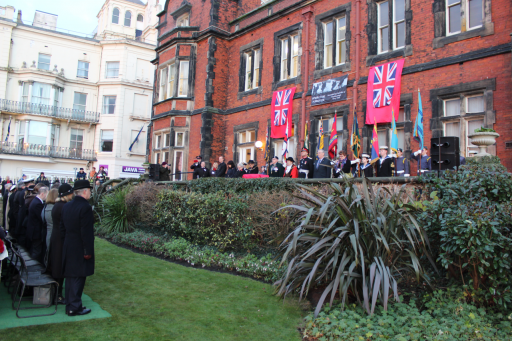Report from Scarborough by Centenary News editor, Nigel Dacre:
The seaside town of Scarborough, in North Yorkshire in the UK, organised a poignant remembrance event this morning – exactly a 100 years after the town was shelled by German destroyers.
The event was held outside the Town Hall, overlooking the bay and seafront. It began just before 8am, the time when the Germans ships opened fire.
Seventeen people died on that day in Scarborough, and one died from his wounds a few days later. The dead included 15-year-old George Taylor, the only Boy Scout to die during WW1, and 14-month old John Ryalls.
During the bombardment, Scarborough Castle, the Grand Hotel, 3 churches, a school, and private homes were damaged. In all, more than 500 shells were fired at the town, and around 200 buildings were damaged,
Hartlepool and Whitby, further along the North Sea coast, were also attacked during the morning. The attack on the three towns resulted in 137 deaths, and 592 casualties.
At the event this morning in Scarborough, local officials gave speeches, and a group of children from a nearby primary school, that had been damaged in the bombardment, laid 18 individual poppies at a commemerative bench.
The names of those who died in the bombardment were also read out – and as each name was read, a maroon was fired from Scarborough Castle.
Off the coast, just outside the bay, a small armada of local ships, organised by the RNLI and Scarborough Yacht Club, laid wreaths and sailed close to where the German ships carried out the attack.
“Our 9/11”
The Lord Lieutenant of North Yorkshire, Barry Dodd, spoke at the event – describing the bombardment as “an act of terrorism”. He said: “It was our 9/11 – and it changed the way the British public perceived the war”.
But he went on say how the Germans have changed from being our “enemies” to being “our firm friends, colleagues and allies”. He said: “Scarborough proves that our enemies of today can be our friends of tomorrow”.
The Chairman of the Scarborough Maritime Heritage Centre, Mark Vesey, told the audience that Scarborough had been “an easy target” for the Germans – and that it is “hard to imagine what it would have been like during the bombardment”.
He described how the attack led to “a huge boost in recruitment” for the British forces – and how Churchill’s description of the German Navy as “the baby killers of Scarborough” was reported in newspapers around the world.
Other remembrance events in Scarborough today will include a service at St Mary’ Church, attended by Commander Jan Hackstein, the German Attache to the UK, and the laying of a wreath by local school children at the newly constructed commemorative cairn, that has been placed at the cemetery where 17 of the victims are buried.
See more photos of the Scarborough event here, a report on the day’s events in Hartlepool here, and a Reflections article here.
Uploaded by: CN Editor
